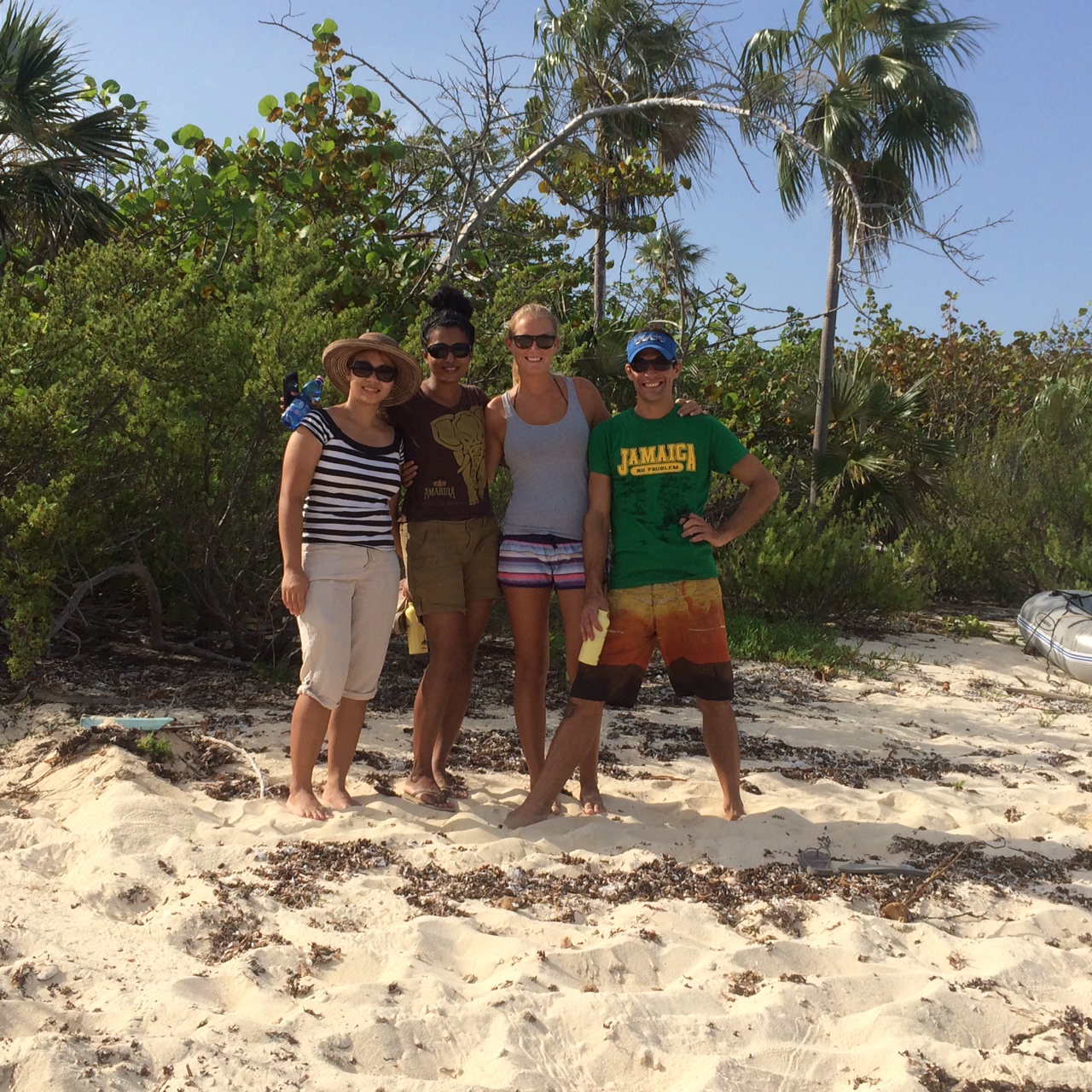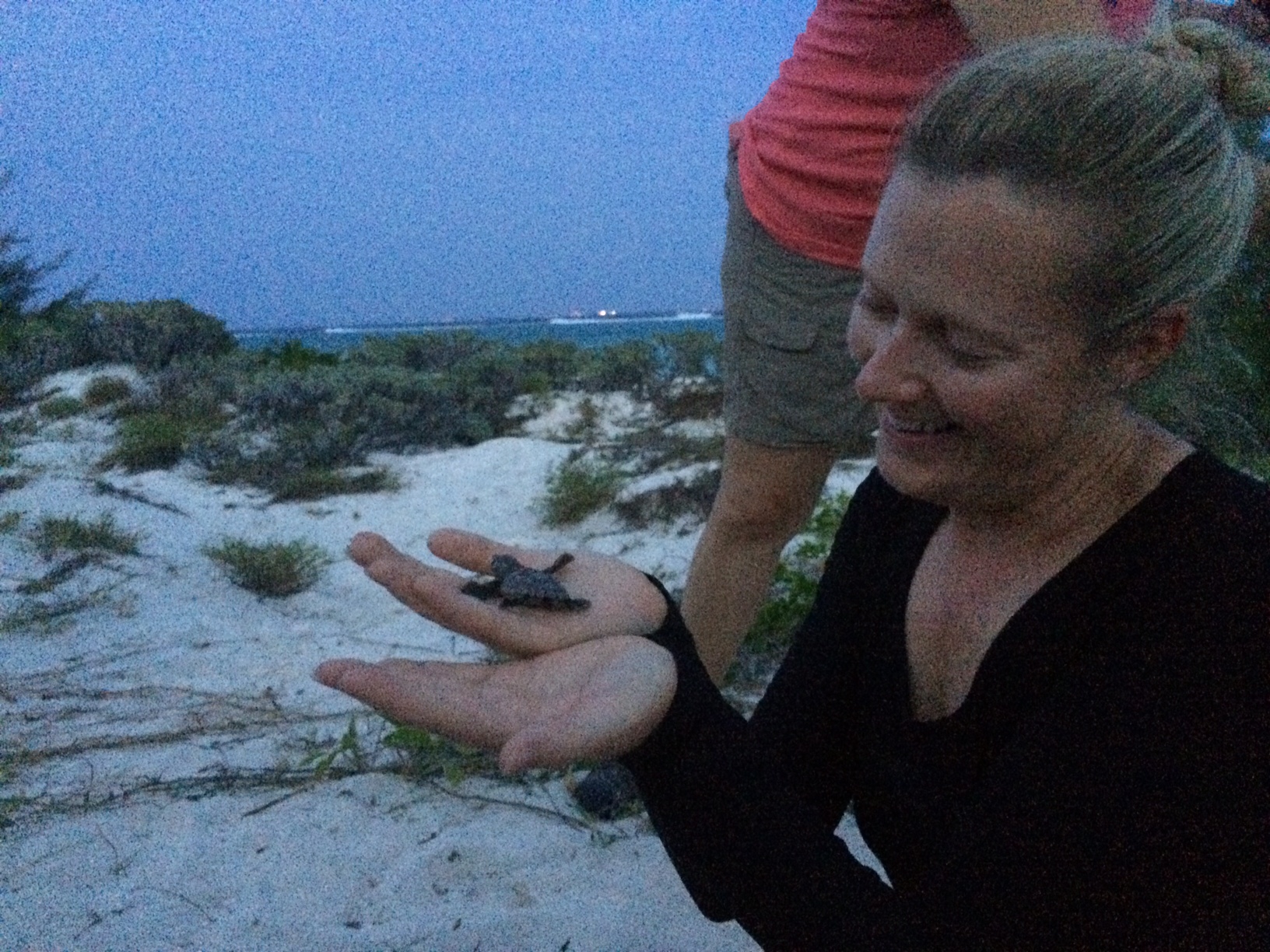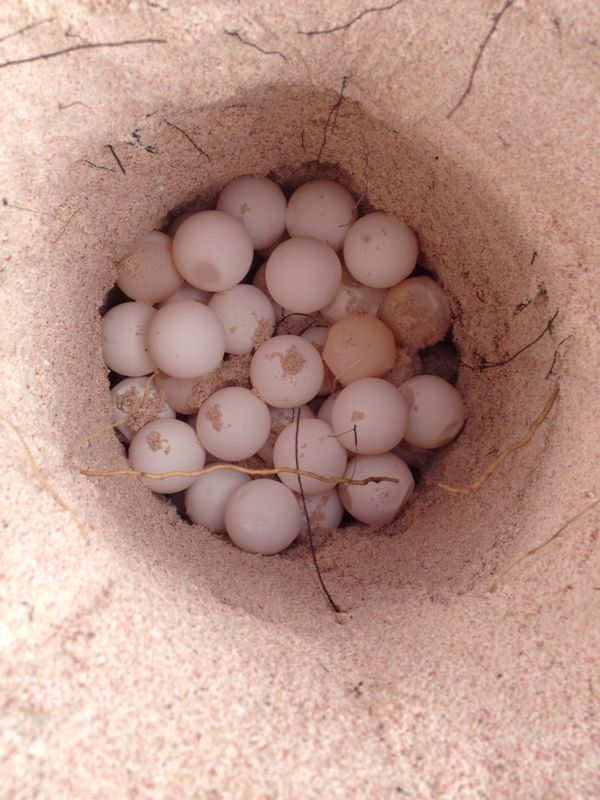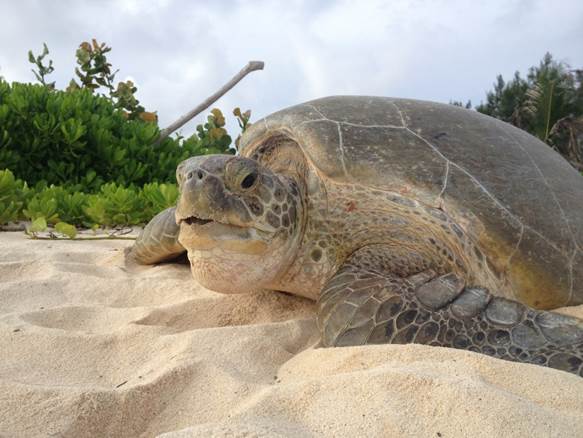Marine Life & Conservation
It’s Turtle Nesting Season and the Southern Cross Club in Little Cayman Stands Guard as the First Nest of the Season Hatches
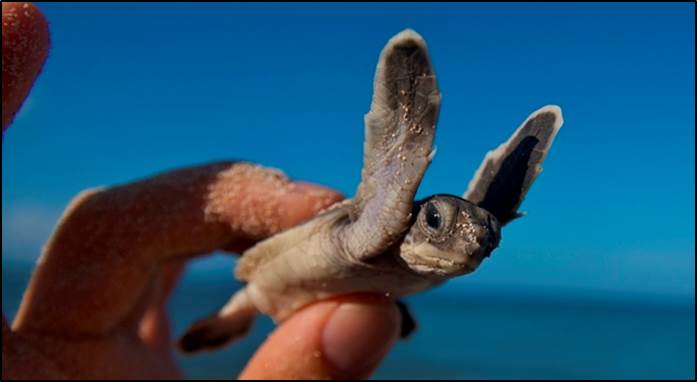
On a quiet Little Cayman beach on the evening of Saturday 5th July, a small group of lucky and excited turtle watch volunteers witnessed a rare and special event – the hatching of the island’s first turtle nest of the season. This is the ultimate payoff for the volunteers who work with the Cayman Islands Department of Environment’s Marine Turtle Research Conservation Program by walking the beaches to spot and protect turtle nests from May to November. It is also a rare one because predicting when a nest will hatch is never certain.
“It’s incredibly difficult to catch a nest hatching – we were very lucky because it is such a special thing!” says Jennifer Mills, general manager of the Southern Cross Club and long time turtle watch volunteer. Mills says they had an idea that the Loggerhead nest might hatch on Saturday night, and although their prediction was right, by the time they arrived on site most of the baby turtles had left and only four remained. “We could tell from the tiny tracks that those that had already hatched had made it safely to the sea.”
The volunteers carefully watched the last four babies struggle out of the nest, and they made sure the hatchings didn’t get caught up in nearby shrubs or fall victim to predators. Although Mills has been a turtle watch volunteer for 11 years, she has only seen a nest hatching 3 or 4 times.
“It was incredibly exciting because we watched the baby turtles take their first steps to the sea! To watch them go into the water – it’s a huge relief because you know they have at least made it that far and they have a long way to go,” she said. “We could not contain our excitement on Saturday! To witness such a wonder of nature is, for me, overwhelmingly wonderful. I feel very privileged to have been part of it.”
Fellow volunteer and Southern Cross Club co-worker Renita Schouten was also there to see the baby turtles begin their journey to the sea. “It was incredible! Being a turtle watch volunteer is one of the coolest things to do here. It’s a great project, all for the good of the island.”
The government’s turtle conservation program relies on volunteers like Mills, Schouten and other Little Cayman residents to help find and monitor nests during season, and at the Southern Cross Club a beach walk is organized every Monday. Residents working at neighbouring resorts also target specific beaches in groups, clearing trash and keeping an eye out for turtle activity. Beachfront home owners help out by walking those beaches, and Mills says this makes a big difference because all crucial areas are covered.
“This then leaves some key areas to be covered by group walks and we cover these areas in Spot Bay, Bloody Bay and Jackson’s. Our staff here is very supportive, religiously participating in the Monday group walk and sharing their experiences, creating awareness amongst the resort guests.”
The volunteers report their finds by calling the Sea Turtle Hotline 345-938-NEST (938-6378). New turtle nests are marked and protected. Mills says volunteer response this year has been outstanding.
“We are very lucky here on Little Cayman to have a community which genuinely cares about the island; our residents are conservation minded and have an avid interest in protecting the marine environment,” she said.
The Southern Cross Club and the Central Caribbean Marine Institute organized an island-wide beach cleanup in advance of nesting season to provide turtles with pristine beaches on which to lay their eggs. During May and June sea turtles mate and the females swim ashore to lay their eggs on the beach. In an enduring mystery of the sea, the turtles that lay their eggs on Little Cayman were hatched from nests on the same beaches. They come home to nest, and it is up to their human neighbours to protect nesting turtles, turtle nests and baby turtles.
“When the nesting is in full swing there are so many nests here, it is essential for the whole community to come together to support this project and together do all we can to protect our turtles,” says Jennifer Mills.
Department of Environment Research Officer Janice Blumenthal: “Thanks to the Southern Cross Club and the rest of the Little Cayman Community, we have already found, marked and protected 30 turtle nests in Little Cayman.”
The Department of Environment conservation program raises awareness on all three islands and educates the public on what needs to be done to protect the turtles, and thanks to these efforts, sea turtles are making a comeback. Cayman waters have traditionally been home to four types of sea turtles – green, loggerhead, hawksbill and leatherback. Once abundant, the turtle populations declined almost to extinction because of commercial fishing.
The Department of Environment began surveying beaches in 1998 to identify turtle nests and track the nesting season, and from the start asked the community to help. In addition to reporting turtle nests and tracks, beachfront property owners and managers are asked to use turtle friendly lights, or turn off lights from May to November.
A certain amount of turtle eco-tourism has developed, a direct result of properties like the Southern Cross Club taking part in protecting the nests and improving survival chances for the hatchings. For now the turtle watches are meant to patrol the beaches to log new nests. When the nests start hatching in the fall, the focus shifts as the hatchlings begin their dangerous journey to the sea. Females who survive into adulthood may someday return to nest on the same Little Cayman beach where they were born.
With an officer of the Cayman Islands Department of Environment, Jennifer Mills and the other Little Cayman volunteers will in a few days return to excavate the nest that hatched over the weekend to count the shells and see how many turtles hatched. They will rescue and release any baby turtles that may have hatched late and remove the eggs that didn’t develop. All this information will be recorded for the conservation program.
While sea turtles are making a comeback in Cayman, the overall worldwide population of the highly migratory turtles is either endangered or threatened. The actions of volunteers on the beaches of Little Cayman contribute to the survival of the species, and the recovery of this beloved symbol of the Cayman Islands, also part of a shared Caribbean heritage.
About the Southern Cross Club
The casually sophisticated Southern Cross Club Fish & Dive Resort is Little Cayman’s original resort. It features 12 beachfront bungalows complete with a top-rated, professional in-house diving and fishing operation. A unique blend of rusticity and elegance the resort is often described as “Barefoot Luxury”. Guests can expect friendly and diligent service, delicious food, inviting rooms with breath-taking views and a comfortable dive boat ― a few of the things that bring them back year after year. Little Cayman is renowned for its breath-taking and pristine coral reefs and spectacular dive adventures. The resort’s beach-based location also provides flats fisherman with access to Bonefish and Permit just minutes away.
For reservations or more information:
Telephone: 1 (800) 899-CLUB (2582)
E-mail info@southerncrossclub.com
Website: www.southerncrossclub.com
Facebook: www.facebook/SouthernCrossClub
Marine Life & Conservation
Paul Watson Released as Denmark Blocks Japan’s Extradition Bid

Renowned anti-whaling activist Paul Watson has been released from custody in Greenland after spending five months in detention. Denmark’s Justice Ministry rejected Japan’s request for his extradition, citing insufficient guarantees that his time already served in custody would be credited against any potential sentence.
The 74-year-old Canadian-American was arrested on July 21 in Nuuk, Greenland’s capital, when his ship docked to refuel. His arrest was based on a 2012 Japanese warrant related to a 2010 encounter in Antarctic waters. Japan alleged Watson obstructed operations and caused damage to a whaling research ship during efforts to disrupt illegal whaling. Watson has consistently denied these claims, maintaining his commitment to marine conservation.
Denmark, which oversees extradition matters for Greenland, concluded that while the legal conditions for extradition were met, the lack of assurances from Japan regarding time-served credit made extradition untenable.
In a video shared by his foundation, Watson expressed gratitude and relief, saying, “After five months, it’s good to be out… and good to know they’re not sending me to Japan.” He added that the most difficult part of his time in custody was being separated from his two young sons.
Watson is a pioneering figure in marine conservation, known for founding the Captain Paul Watson Foundation in 2022 after decades of activism with the Sea Shepherd Conservation Society. His bold efforts to defend marine life have earned him widespread support, including from celebrities and conservationists. His work has also been featured in the acclaimed reality TV series Whale Wars.
Watson’s lawyer, Jonas Christoffersen, praised the decision, stating, “We are happy and relieved that Paul Watson is now free.” He added that Watson is eager to reunite with his family and continue his vital work.
The arrest occurred while Watson’s vessel, the M/Y John Paul DeJoria, was en route to the North Pacific with a team of 26 volunteers to intercept a Japanese whaling ship. His foundation described the arrest as politically motivated and emphasized that Watson’s actions were focused on ending illegal whaling practices.
Japan resumed commercial whaling in 2019 after leaving the International Whaling Commission, asserting that whale meat is a cultural tradition. Conservationists, however, continue to challenge these practices, highlighting their impact on marine ecosystems.
Despite the challenges, Watson remains steadfast in his mission to protect marine life and bring attention to whaling practices. His dedication to ocean conservation has made him a globally respected advocate for the environment.
Marine Life & Conservation
12 Days of Zero-Waste Fish-mas

This holiday period, the Marine Conservation Society, the UK’s leading ocean membership charity, invites you to make some simple changes to eating fish this Christmas to help our seas.
Dr Kenneth Bodles, Head of Fisheries and Aquaculture at the Marine Conservation Society, said, “During the festive season, our consumption increases, but so does waste. Sustainability isn’t just about where food comes from – it’s also about how you use it. By reducing waste and making the most out of your seafood, you’re not only taking steps to be more ocean-friendly, but can also help to cut costs during what is often one of the most expensive times of the year”.
The Marine Conservation Society has compiled twelve tips on how to consume seafood sustainably with zero-waste this Christmas:
Buy whole fish instead of fillets
Instead of fillets, consider buying whole fish such as salmon, hake, or lemon sole. By adopting a “nose to tail” approach with cooking, whole-baked fish not only feeds a crowd, but also helps to minimise waste and maximise sustainability by using up every part of the animal, including bones, skin, and fat.
Make fish stock
Leftover fish bones or shells can be put to good use by boiling them to make a nourishing fish stock or bisque. This can be frozen and preserved for later use and makes for a flavourful base in a soup.
Make your own fish pâté
Avoid waste by turning leftover fish, such as smoked mackerel or salmon, into a delicious pâté by blending with cream cheese and lemon. Perfect when paired with crackers.
The sustainability of salmon and mackerel varies depending on where and how it is caught or farmed. For more information on green-rated options, check the charity’s Good Fish Guide.
Buy frozen
By purchasing seafood that is frozen or vacuum-packed, this helps to reduce waste by extending the shelf life of your food.
Fish pie
If you’re wondering what to do with leftover cooked fish, why not opt for a classic fish pie with mashed potatoes, leeks, and a cheesy sauce? A sure crowd pleaser on Boxing Day.
Use the head
Don’t forget the fish head! The meat is incredibly tender and flavourful. The charity recommends a cod’s head curry or recreating Fallow’s renowned cod’s head in siracha butter.
By stretching your ingredients further, not only is this a more sustainable way to enjoy seafood, but also cost-effective by repurposing leftovers and cooking creatively.
Boxing Day brunch
Mix leftover kippers or smoked salmon with scrambled eggs for a tasty, zero-waste, Boxing Day brunch.
For best choice, make sure you buy kippers, or herring, from the North Sea and the North Irish Sea.
Zero-waste storage
A top tip from the Marine Conservation Society to avoid waste is freezing fish offcuts to save for future use.
Crisp up the skin
Even leftover fish skin can be turned into a quick savoury snack by crisping it up in an air fryer with a little olive oil and salt.
Anchovies two ways
Leftover anchovies can either be blended with butter to make a delicious anchovy butter or tossed into pasta for a hit of umami flavour.
The charity recommends opting for anchovies caught in the Bay of Biscay for best choice.
Fishcakes
For an easy, zero-waste meal, leftover seafood trimmings can be mixed with mash and fried in breadcrumbs to make fishcakes.
Pickled mussels
Try pickling mussels in 1:1 vinegar and water, with a dash of sugar for a sustainable, zero-waste snack that can be enjoyed well beyond the festive season.
Mussels farmed in the UK are a seafood superhero. Grown using low-impact methods and harvested by hand, they get all the food they need from the sea around them. This makes them one of the most sustainable, ocean-friendly, and cost-effective seafood options.
Players of People’s Postcode Lottery have raised £6.6M towards the Marine Conservation Society’s vital work in making seafood more sustainable.
Laura Chow, Head of Charities at People’s Postcode Lottery, said: “Fish is a festive favourite for many, but making sustainable choices when it comes to how we buy and eat seafood makes all the difference for our ocean. Support from players of People’s Postcode Lottery has helped the Marine Conservation Society further its sustainable seafood work, so that we can all enjoy healthier, better protected seas.”
The Marine Conservation Society encourages you to make sustainable seafood choices a year-round habit, not just for Christmas. To check how sustainable the seafood on your plate is, you can visit the charity’s Good Fish Guide. The Guide helps consumers and businesses identify the most sustainable seafood using a simple traffic light system, based on where and how species are caught or farmed. Green is the best choice, amber means improvements are needed, and red indicates fish to avoid buying.
Zero-waste gift idea
Why not embrace a zero-waste Christmas by gifting a membership to support marine conservation? It’s a meaningful, low-waste gift that helps protect our ocean for generations to come. Memberships start from as little as £5 a month – the price of a sandwich and drink from your local coffee shop.
Find the latest sustainable seafood advice for wild-caught and farmed seafood on the Good Fish Guide, downloadable to your phone from www.mcsuk.org/goodfishguide.
-

 News3 months ago
News3 months agoIconic SS United States to become the World’s Largest Artificial Reef
-

 Blogs2 months ago
Blogs2 months agoScubaverse Christmas Gift Guide 2024: Day 4
-

 News2 months ago
News2 months agoSanta Divers take the Plunge for Charity
-

 Blogs2 months ago
Blogs2 months agoScubaverse Christmas Gift Guide 2024: Day 1
-

 News3 months ago
News3 months agoDiscover Turquoise Divers and Media Luna Beach & Dive Resort: A Premier Diving and Relaxation Destination in Roatan
-

 Blogs2 months ago
Blogs2 months agoScubaverse Christmas Gift Guide 2024: Day 5
-

 Blogs2 months ago
Blogs2 months agoScubaverse Christmas Gift Guide 2024: Day 2
-

 News3 months ago
News3 months agoToucan Diving at Plaza Beach and Dive Resort Bonaire Introduces PADI Mermaid Training


